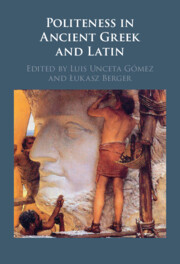Book contents
- Politeness in Ancient Greek and Latin
- Politeness in Ancient Greek and Latin
- Copyright page
- Contents
- Figures and Tables
- Contributors
- Preface
- Abbreviations
- Part I Introduction
- Part II The Expression of Im/Politeness
- Part III Im/Politeness in Use
- Chapter 6 Friendship Terms in Plato
- Chapter 7 Conversational Openings and Politeness in Menander
- Chapter 8 Im/Politeness of Interruptions in Roman Comedy
- Chapter 9 Im/Politeness and Conversation Analysis in Greek Tragedy
- Chapter 10 Qui Honoris Causa Nominatur
- Chapter 11 Banter, Teasing and Politeness in Varro’s De Re Rustica
- Part IV Ancient Perceptions on Im/Politeness
- Glossary
- References
- Index Rerum
- Index Locorum
Chapter 11 - Banter, Teasing and Politeness in Varro’s De Re Rustica
from Part III - Im/Politeness in Use
Published online by Cambridge University Press: 08 September 2022
- Politeness in Ancient Greek and Latin
- Politeness in Ancient Greek and Latin
- Copyright page
- Contents
- Figures and Tables
- Contributors
- Preface
- Abbreviations
- Part I Introduction
- Part II The Expression of Im/Politeness
- Part III Im/Politeness in Use
- Chapter 6 Friendship Terms in Plato
- Chapter 7 Conversational Openings and Politeness in Menander
- Chapter 8 Im/Politeness of Interruptions in Roman Comedy
- Chapter 9 Im/Politeness and Conversation Analysis in Greek Tragedy
- Chapter 10 Qui Honoris Causa Nominatur
- Chapter 11 Banter, Teasing and Politeness in Varro’s De Re Rustica
- Part IV Ancient Perceptions on Im/Politeness
- Glossary
- References
- Index Rerum
- Index Locorum
Summary
This chapter examines Varro’s depictions of teasing and banter in his dialogue De Re Rustica, with particular reference to issues of im/politeness. In many cases, this banter involves some kind of provocation of the addressee, and so risks being construed as impolite. In most instances, however, the witty phrasing conveys a playful intent, which ensures that the remark does not cause offence. The end result is usually heightened rapport among the participants. In several cases Varro’s teasing involves ‘collaborative’ banter, in which both participants contribute to the construction of a playful conceit. In other instances, however, the teasing quips are one-sided, with no response reported. In such cases the emphasis seems to be on the display of quick-witted inventiveness for its own sake. This energetic interaction differs from the highly conventionalized language of social negotiation typically used by the Roman elite. Indeed, it is significant that Cicero’s real-life epistolary relationship with Varro was marked by a degree of formality that eschewed the use of banter. In this respect, the right to tease was one extended only to a privileged sub-set of personal acquaintances
- Type
- Chapter
- Information
- Politeness in Ancient Greek and Latin , pp. 273 - 292Publisher: Cambridge University PressPrint publication year: 2022

